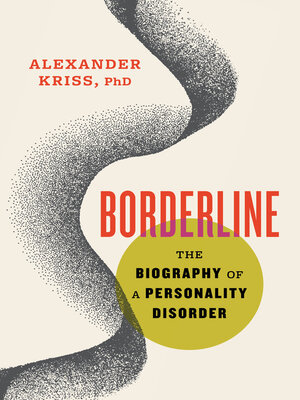
Sign up to save your library
With an OverDrive account, you can save your favorite libraries for at-a-glance information about availability. Find out more about OverDrive accounts.
Find this title in Libby, the library reading app by OverDrive.



Search for a digital library with this title
Title found at these libraries:
| Loading... |
An intimate, compassionate, and expansive portrait of Borderline Personality Disorder that rejects the conventional wisdom that the condition is untreatable and those diagnosed with it are “difficult,” told by a psychologist who specializes in BPD
Mental illness is heavily stigmatized within our society, and folks with BPD are portrayed as especially hopeless by doctors and popular culture alike. When, as a graduate student, Alexander Kriss first began working as a therapist in the field, his supervisors warned him that borderline patients were manipulative and had a tendency to drop out of treatment. Yet, years later, when Kriss was establishing his private practice and a patient named Ana came to his office, he felt compelled to try to help her, despite all of the warnings he'd heard.
Borderline is the story of his work with Ana—how their relationship led Kriss to a deeper understanding of the borderline experience and what it means to be a person. Borderline is also the story of the disorder itself—Kriss traces accounts of the condition going back to antiquity, showing how this diagnosis has been known by many names over the millennia, most of them gendered: witchcraft, hysteria, moral insanity. All referred to a person—usually a woman—whose behavior and personality were seen as unstable, unpredictable, and uncontrollable. Kriss illustrates the pivotal role borderline patients played in the invention of psychotherapy, the development of modern psychology and psychiatry, and current attitudes about what it means to be healthy. Through the interweaving of personal and global histories, he ultimately argues that BPD is the most important diagnosis of our time: the individual expression of cultural angst that emerges out of systemic inequality, the fracturing of narratives, and our collective search for meaning and identity.
Mental illness is heavily stigmatized within our society, and folks with BPD are portrayed as especially hopeless by doctors and popular culture alike. When, as a graduate student, Alexander Kriss first began working as a therapist in the field, his supervisors warned him that borderline patients were manipulative and had a tendency to drop out of treatment. Yet, years later, when Kriss was establishing his private practice and a patient named Ana came to his office, he felt compelled to try to help her, despite all of the warnings he'd heard.
Borderline is the story of his work with Ana—how their relationship led Kriss to a deeper understanding of the borderline experience and what it means to be a person. Borderline is also the story of the disorder itself—Kriss traces accounts of the condition going back to antiquity, showing how this diagnosis has been known by many names over the millennia, most of them gendered: witchcraft, hysteria, moral insanity. All referred to a person—usually a woman—whose behavior and personality were seen as unstable, unpredictable, and uncontrollable. Kriss illustrates the pivotal role borderline patients played in the invention of psychotherapy, the development of modern psychology and psychiatry, and current attitudes about what it means to be healthy. Through the interweaving of personal and global histories, he ultimately argues that BPD is the most important diagnosis of our time: the individual expression of cultural angst that emerges out of systemic inequality, the fracturing of narratives, and our collective search for meaning and identity.






